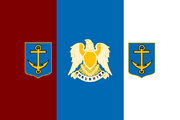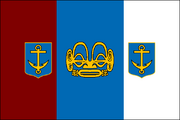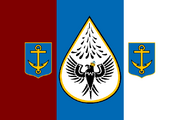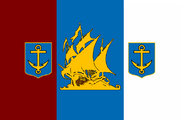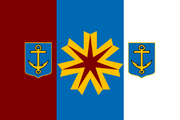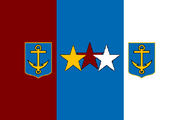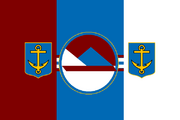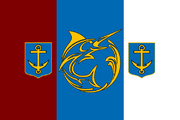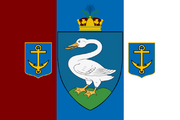Vexillological standards of Burgundie
The vexillological standards of Burgundie, or the Burgoignesc code of flag decorum, Decorum della drapeaus Burgoignesc, is the design standard for government flags of Burgundie, as established by the Burgoignesc Code of Laws, Temporal Sins, and Their Punishments.
It delineates flag composition for the national flags, royal flags, country flags, province flags, regional flags, county and municipal flags, as well as flags of the agencies, ministries, and departments of the government.
Jurisdictional flags
National flag
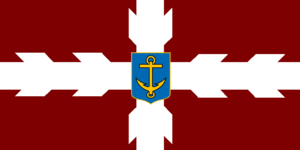
The Flag of Burgundie is the basis of all national flags and sets forth the palette from which all other jurisdictional and governmental flags are derived. It is a field sanguine with a cross écotée argent. It has a badge of an eschuteon azul with a cross of St. Clement or.
The colors sanguine, azul, argent, and or are all pegged to specifical RGB color codes with are maintained across all flags and are subject to copyright law when used in combination with each other.
- Sanguine Burgoignesc R:127 G:0 B:0, or Hex #7F0000
- Azul Burgoignesc R:0 G:105 B:180, or Hex #0069B4
- Argent Standard R:255 G:255 B:255, or Hex #FFFFFF
- Or Burgoignesc R:255 G:194 B:0, or Hex #FFC200
The motif of St. Clement's cross in escutcheon and the cross écotée are recurring in many other jurisdictional and governmental flags, but only the color is mandated, not the use of the motifs.
Burgundie's national flag has a ratio of 1:2 and scaled proportionally to its use, typically 1/5 of the height of the flagpole to the nearest and larger 5 meters.
- 2 meter wall mounted flagpole at a 66* angle (common for displays on government buildings with a plaza or courtyard), flag dimensions: 1m x 2m
- 5 meter free standing,vertical flagpole (common for display in front of municipal and county buildings), flag dimensions: 1m x 2m
- 10-15 meter flagpole (common for display in front of regional and provincial government buildings, as well as at embassies overseas), flag dimensions: 3m x 6m
- 20-25 meter flagpole (common for display at military bases and country and national government buildings) flag dimensions: 5m x 10m
Usage and display of the national flag of Burgundie
The national flag of Burgundie is a state flag and not a civil flag. It is not permitted to be owned, displayed, or used in design by non-government agencies. As a visual representation of Burgundie it is considered a sacred symbol and therefore above "base and vulgar displays of nationalist sentiment". The flag is permitted to be flown on government buildings when it is conducting/providing its mission essential functions on that premises, in the proper orientation, well lit, not in a state of neglect or disrepair, and flown highest amongst all other flags.
The flag is also permitted to be flown in cemeteries where veterans are buried and may be used as a temporary drape on a casket of a deceased veteran and presented to a survivor of the veteran's legally recognized family for "tasteful and respectful displace in the recipients domicile, not observable from the outside of the domicile." Because Burgundie does not have a standing army in Levantia this is more common in Equatorial Ostiecia and the provinces of the BORA.
Repercussions for civilians for the first offense is a 12 hr course on the Vexillological standards of Burgundie. For a second offense it is the same course again and a 100 Taler fine and classified as a misdemeanor. A third offence is considered a felony and carries a jail sentence of 5-15 yrs, automatically assigned to a penal battalion but not eligible for expedited time served. In the rare case of a fourth offense the offender is stripped of their citizenship if they have it and given a choice of permanent exile or be put on trial for treason.
For businesses using the likeness of the flag, a first offense is a 24hr Vexillological standards of Burgundie course for the artist and the approving manager as well as a weighted fine to account for 1% of annual income. A second offense resulted in a repeat of the course for the artist, the manager, but to include senior management, as well as a fine of 2% of net income. A third offence results in the revokation of the businesses licenses and a surrender of its intellectual property to the public domain.
Country flags
Country flags also maintain a 1:2 ratio and must contain the colors of the national flag of Burgundie:
- Sanguine Burgoignesc R:127 G:0 B:0
- Azul Burgoignesc R:0 G:105 B:180
- Argent Standard R:255 G:255 B:255
- Or Burgoignesc R:255 G:194 B:0
While they all, except BORA contain the cross écotée there is no specific requirement for this to be the case and it is expressed in a variety of orientations and color combinations.
Usage and display of country flags
The country flags act as both a state flag and a civil flag and can be flown by civilians and the government alike. Flags produced for civilian use are manufactured at a government manufactory and must be exact replicas of the flag's design. They are not to be combined in whole or in part with other designs for any usage. The flag is to be flown in the proper orientation, well lit, not in a state of neglect or disrepair, and flown highest amongst all other flags except the national flag of Burgundie.
To store a country flag, it is folded in such a way that the badge is centered in the folded flag. For most flags this is achieved by folding the flag into thirds lengthwise so that the middle third is facing up and then folding the fly and the hoist inward, leaving a double length of either side on the last fold, folding it across the length and the tucking the remaining length into the pocket under the field with the badge to secure the flag into its folded shape. Because the flag of Equatorial Ostiecia is a nordic cross design, it is folded the same lengthwise, but only one demi-fold of the hoist is made before the fly is folded in on itself and then the last double length of the fly is folded over and tucked into the pocket as before.
When the flag is in a state of neglect or disrepair, it is brought to a local post office where they are collected and sent to the government manufactory where they are anointed in oil, a thanksgiving is said over them by a priest, and they are incinerated. This typically occurs once after the rain season in the different territories of Burgundie and once after the hurricane/storm season.
Provincial flags
-
Flag of Chaukhira
-
Flag of Sudmoll
-
Flag of Wintergen
-
Flag of Port de Vent
-
Flag of Alcairet
-
Flag of Iles Evangeline
-
Flag of Nauta Normand
-
Flag of Argaea
-
Flag of Torlen
-
Flag of Antilles
Ratio 1:1.5
Provincial flags follow a standard based on their country flag. For BORA provinces the standard is the BORA vertical, equal width tricolor with a badge of the province in the center band and two crosses of St. Clement in the other bands.
For Ile Burgundie, it is the flag of Ile Burgundie in canton and a solid field of different colors for each province.
For Nostrestran, it is the flag of Nostrestran in canton and a field of solid sanguine Burgoignesc and a badge of the province.
For Faramount it is the grrffon of Faramount in an equilateral triangle at the hoist with variation on the remainder of the fly for each province.
For Equatorial Ostiecia, it is the Equatorisiose sol in canton and variation on the remainder of the fly for each province.
Regional flags
County and municipal flags
Government flags
Royal flag

Ministerial flags
Departmental flags
-
Ensign of the Navy of Burgundie
-
Standard of the Army of Burgundie
-
Standard of the Royal Air Service of Burgundie
-
Standard of the Defense Intelligence Service
-
Ensign of the Vocivine National of Burgundie
Because these departments represent the whole nation they are maintained at the same 1:2 ratio that the national flag is maintained at.
Agency flags
Other subcomponent flags
Army of Burgundie subcomponent flags
See also





